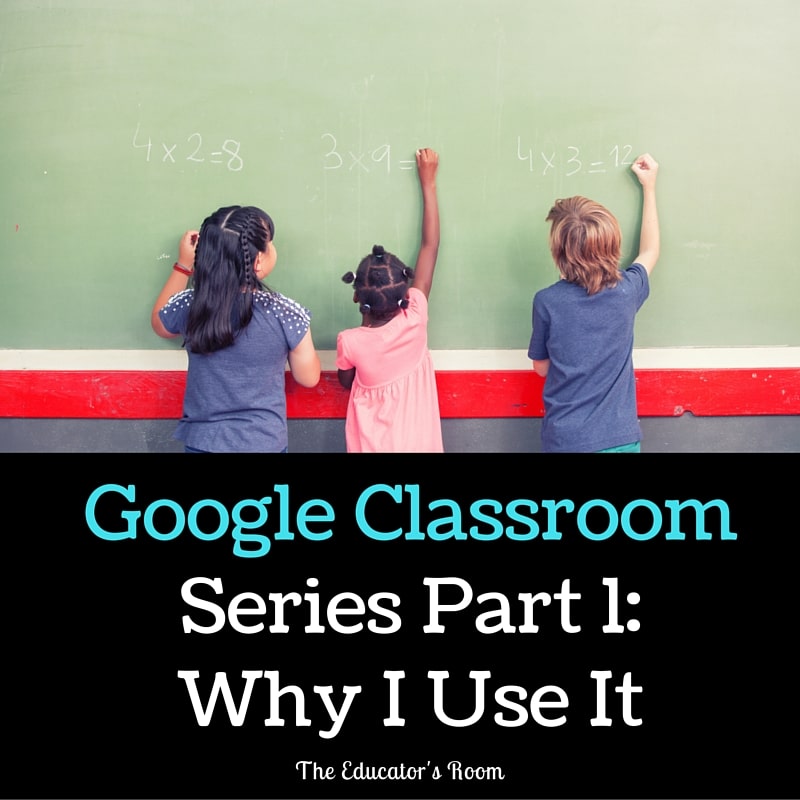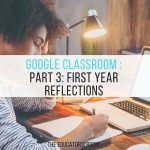I love the feel of paper in my hands. My husband has desperately been trying to convert me to the Kindle, but I keep buying more printed books. Yes, we’re running out of bookshelf space (but isn’t it every English teacher’s dream to own an in-home library?), and yes, digital copies are cheaper, but I find it difficult to emotionally invest in something I can’t feel. Therefore, when our technology crew presented training on Google Apps and Google Classroom, I was hesitant. How can my students effectively collaborate when they don’t have to sit near each other? How can they annotate without a pen in hand? How can they edit papers without marking them up? Originally, I only planned to use Google Classroom to post digital copies of class materials- now a student wouldn’t ask me to print him another copy: the responsibility was his! And I could make announcements about plan changes if I was absent or if we had a snow day. But that’s it! I never planned to grade electronic copies.
[fusion_builder_container hundred_percent=”yes” overflow=”visible”][fusion_builder_row][fusion_builder_column type=”1_1″ background_position=”left top” background_color=”” border_size=”” border_color=”” border_style=”solid” spacing=”yes” background_image=”” background_repeat=”no-repeat” padding=”” margin_top=”0px” margin_bottom=”0px” class=”” id=”” animation_type=”” animation_speed=”0.3″ animation_direction=”left” hide_on_mobile=”no” center_content=”no” min_height=”none”][bctt tweet=”How can my students effectively collaborate when they don’t have to sit near each other? ” username=”EducatorsRoom”]
Honestly, I don’t know why I changed my mind. Maybe it was the suffocating feeling attached to having twenty more students this year; maybe it was the overwhelming fear of losing a student’s work (which grows immensely when you have a paper-loving dog and curious baby at home); maybe it was the realization that with one student printer at school, my curriculum aspirations needed to be adjusted. Anyway, I decided to run an experiment with my junior honors class: the entire first writing assignment was digital. Students submitted all pieces of the writing process to me through Google Classroom, they peer edited by sharing documents, and I provided feedback without raising a pen. By submitting the final product to Google Classroom, I had no papers to lose or accidentally destroy, I could see the document’s progress, and I reinforced my role as a collaborator. When I graded the assignments, I didn’t cross out words and write revisions; I highlighted the student’s work and commented on the side. Ultimately, the student needed to accept or reject my suggestions.
After that success, I tried something new: instead of spending a day lecturing my students about a unit’s historical and cultural context, I posted my power point and instructed them to take notes by a certain day. Then, I deleted the announcement and gave the students an open-note quiz in class. I gained more needed instructional time while preparing students for the college classroom. Then we had our first Socratic Seminar, and a student asked a profound question just as the bell rang (naturally), so I posted it on Google Classroom for the students to answer that night. The next day, we addressed some of the responses. On our first snow day, I was curious if anyone checked Google Classroom, so I proposed an extra credit question. Over half of the students responded; they explained that whenever I posted something an email was sent and most of them had notifications of emails sent to their phones (they are so tech savvy).
And then one day I grew ambitious: together, as a class, we would create an ACT English Section Study Guide. I set up the template and gave them editing access. That first work day, I was a nervous wreck- if anyone tried to “restore” the document to a previous date, we’d lose everything. After a few minor hiccups, everything ran smoothly. We used that study guide to fuel last minute review. I stood in awe as they reached out to each other asking someone to explain a concept or sharing what tips helped them. They divided and conquered.
Currently, my honors students are finishing the year by creating a review guide for a modern novel. Some are using Google Docs; some are using Google Slides; some are using Google Publisher; it doesn’t matter because Google Classroom will accept any of those apps. They are able to collaborate during and after school hours. Furthermore, I can see exactly who contributed to what. This task and process is more relevant to them than a class presentation.
Google Classroom is a part of all of my classes, but not every class uses it in the same manner; I can tailor the virtual classroom to my students’ needs. Despite my initial hesitation, Google Classroom has established new levels of collaboration among students and teachers. At the end of the year, even though my Classroom Page will dissolve, students won’t complete the traditional backpack purge; their documents will always be available to them. Hopefully, they will be able to continue the great work of this year.
My following articles in this series will cover Google Classroom Set Up and Year Reflections From Students and Teachers.
 [/fusion_builder_column][/fusion_builder_row][/fusion_builder_container]
[/fusion_builder_column][/fusion_builder_row][/fusion_builder_container]







I’m hoping to elevate my use of Google Classroom next year. You’ve given me some great ideas, as always!